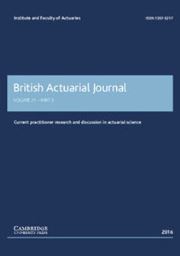Crossref Citations
This article has been cited by the following publications. This list is generated based on data provided by Crossref.
Haberman, S.
Day, C.
Fogarty, D.
Khorasanee, M. Z.
McWhirter, M.
Nash, N.
Ngwira, B.
Wright, I. D.
and
Yakoubov, Y.
2003.
A Stochastic Approach to Risk Management and Decision Making in Defined Benefit Pension Schemes.
British Actuarial Journal,
Vol. 9,
Issue. 3,
p.
493.
Wilkie, A. D.
Waters, H. R.
and
Yang, S.
2003.
Reserving, Pricing and Hedging For Policies with Guaranteed Annuity Options.
British Actuarial Journal,
Vol. 9,
Issue. 2,
p.
263.
Wilkie, David
2003.
Mary Hardy: Investment Guarantees: Modelling and risk management for equity-linked life insurance. John Wiley & Sons. ISBN 0-471-39290-1, 2003..
ASTIN Bulletin,
Vol. 33,
Issue. 2,
p.
439.
De Gooijer, Jan G.
and
Vidiella-i-Anguera, Antoni
2003.
Nonlinear stochastic inflation modelling using SEASETARs.
Insurance: Mathematics and Economics,
Vol. 32,
Issue. 1,
p.
3.
Albrecht, Peter
2003.
Handbuch Institutionelles Asset Management.
p.
427.
Chan, Wai-Sum
Wong, Albert C. S.
and
Tong, Howell
2004.
Some Nonlinear Threshold Autoregressive Time Series Models for Actuarial Use.
North American Actuarial Journal,
Vol. 8,
Issue. 4,
p.
37.
Cairns, Andrew J.G.
2004.
Encyclopedia of Actuarial Science.
Booth, P. M.
and
Marcato, G.
2004.
The Measurement and Modelling of Commercial Real Estate Performance.
British Actuarial Journal,
Vol. 10,
Issue. 1,
p.
5.
Hardy, Mary R.
2004.
Encyclopedia of Actuarial Science.
Chan, Wai‐Sum
and
Ng, Man‐Wai
2004.
Robustness of alternative non‐linearity tests for SETAR models.
Journal of Forecasting,
Vol. 23,
Issue. 3,
p.
215.
Chan, W. S.
Ng, M. W.
and
Tong, H.
2006.
On a Simple Graphical Approach to Modelling Economic Fluctuations with an Application to United Kingdom Price Inflation, 1265 to 2005.
Annals of Actuarial Science,
Vol. 1,
Issue. 1,
p.
103.
Boyle, Phelim
and
Hardy, Mary
2007.
Financial Engineering.
Vol. 15,
Issue. ,
p.
763.
Thomson, Robert J.
and
Gott, Dmitri V.
2009.
Stochastic Models for Actuarial Use: The Equilibrium Modelling of Local Markets.
ASTIN Bulletin,
Vol. 39,
Issue. 1,
p.
339.
Wilkie, A. D.
Şahin, Şule
Cairns, A. J. G.
and
Kleinow, Torsten
2011.
Yet More on a Stochastic Economic Model: Part 1: Updating and Refitting, 1995 to 2009.
Annals of Actuarial Science,
Vol. 5,
Issue. 1,
p.
53.
Butt, Adam
2013.
Effects of scheme default insurance on decisions and financial outcomes in defined benefit pension schemes.
Annals of Actuarial Science,
Vol. 7,
Issue. 2,
p.
288.
Hardy, Mary R.
2014.
Wiley StatsRef: Statistics Reference Online.
Cairns, Andrew J.G.
2014.
Wiley StatsRef: Statistics Reference Online.
Huang, Fei
Butt, Adam
and
Ho, Kin-Yip
2014.
Stochastic economic models for actuarial use: an example from China.
Annals of Actuarial Science,
Vol. 8,
Issue. 2,
p.
374.
Jarvis, Stuart
and
Sharpe, James
2016.
Ersatz Model Tests.
SSRN Electronic Journal,
Siu, Tak Kuen
2016.
A self-exciting threshold jump–diffusion model for option valuation.
Insurance: Mathematics and Economics,
Vol. 69,
Issue. ,
p.
168.

